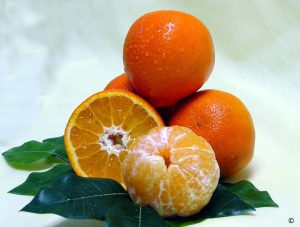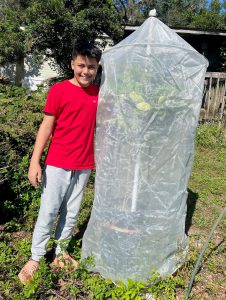Florida means citrus
Florida is synonymous with citrus. No better juice-producing trees are grown in the world. Yet finding 100% Florida orange juice is becoming a challenge. Global markets have made juice too inexpensive for Florida growers to compete. A disease known as HLB or citrus greening has made citrus expensive to grow for commercial Florida citrus growers. Researchers from the University of Florida and the USDA have been working hard at developing citrus varieties that are tolerant to the disease HLB.
The return of dooryard citrus

Because of the development of some tolerant citrus varieties, the University of Florida feels we can begin the return to homeowners growing their own fruit. These varieties can still become infected, but they are tolerant of the disease. In other words, they can tolerate the symptoms enough to still produce viable fruit. One such variety developed by the University of Florida is called Sugar Belle®. This mandarin hybrid is a cross between a Clementine tangerine with a Mineola tangelo. Like a tangerine, it is a soft fruit that is easy to peel and eat. Another variety developed by the USDA is SunDragon, a juice orange. With a large fruit and tough skin, it is proving to have a good sugar content and is very hardy and tolerant of HLB.
The future of citrus
Other varieties are on their way although the process is slow. It takes years to develop new varieties and to test them in the field. Things are looking up but hopefully will not come too little too late for the Florida citrus industry.
Growing healthy trees

Growing these more tolerant varieties and using better cultural practices is key to keeping citrus healthy. Cultural practices are ways of growing plants, such as watering and fertilizer practices, that help citrus grow better. One cultural practice involves using an individual protective cover (I.P.C.). You may have noticed these white net coverings over young citrus as you meander your way through the citrus country. These nets are designed to keep the Asian Citrus Psyllid, the insect that spreads HLB, off the tree long enough for the trees to get a healthy start.
Growing citrus yourself
If you are interested in learning what tools you need to grow citrus at home while getting the opportunity to take home one of the two varieties mentioned above, we are offering a class on March 11th. The cost of the class only is $10. You also have the choice to take home either tree variety and an I.P.C. to go with it for $55. Lastly, we offer a choice of getting both varieties and two I.P.C.s with the class for $85. To get links to sign up for the class call the UF/IFAS Extension, Highlands County at (863) 402-6540. You can also pay at the office and avoid the online service charge. We cannot take walk-ins. The Extension office takes checks and cash but cannot take charge or debit cards.
Stay in touch!
Sign up for our Highlands County Master Gardener Volunteer, “Putting Down Root” Newsletter Here
That’s what’s new from the Hometown Gardener. Like and Follow me on Facebook at Hometown Gardener.
Read my other blogs by clicking here.
Join our Facebook groups Highlands County Master Gardeners, Science-Based Florida Gardening Answers, Central Florida Butterfly and Pollinator Club, and Heartland Beekeepers
 1
1
